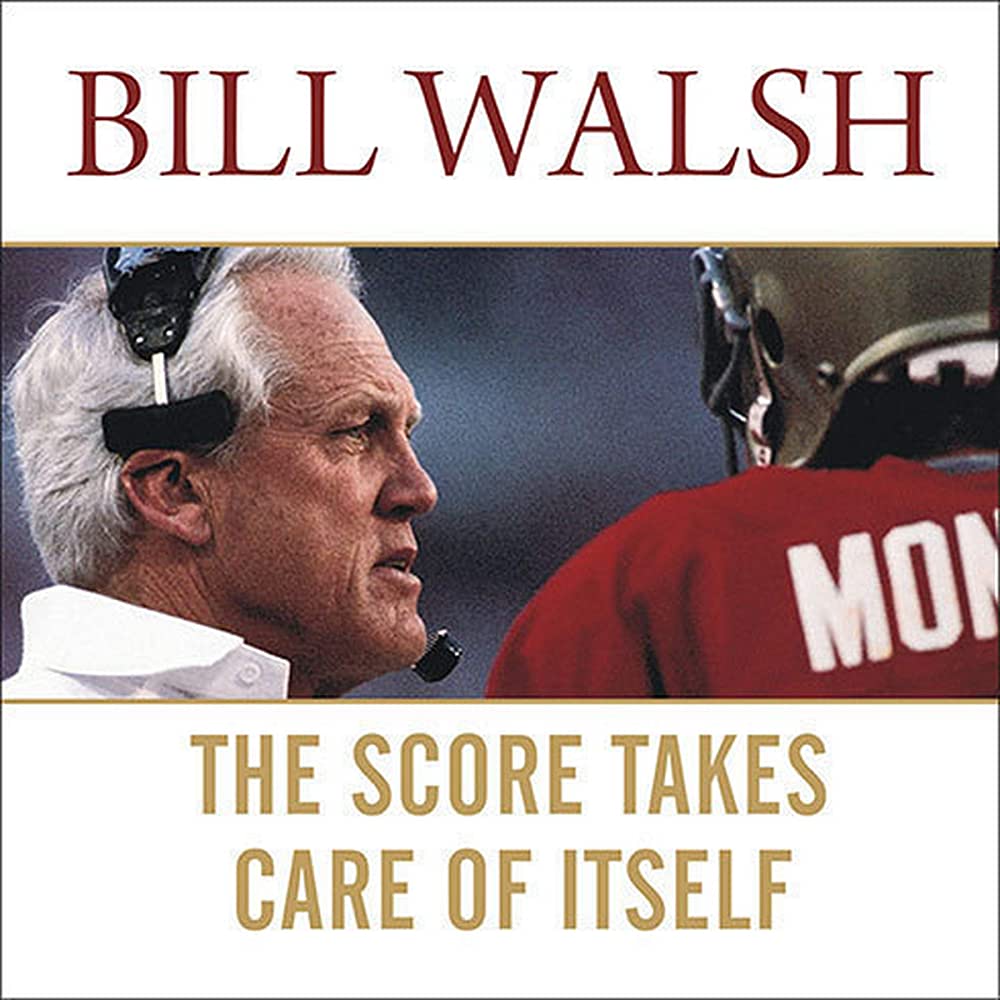
Notes on
The Score Takes Care of Itself
by Bill Walsh
• 4 min read
I particularly like the title of the book, The Score Takes Care of Itself.
If you do all the right things to precision, then the score takes care of itself.
That was one of Bill Walsh’s sayings—and it sums up the philosophy this book presents.
Standard of Performance
Bill has his Standard of Performance, which was the first thing he implemented when he joined the 49’ers. It is a leadership philosophy, a way of doing things.
The first thing it says is to do your best. So, do your job at a high level in all aspects of it.
It’s really a set of values and beliefs.
I will include Walsh’s Standard of Performance for reference.
- Exhibit a ferocious and intelligently applied work ethic directed at continual improvement;
- demonstrate respect for each person in the organization and the work he or she does;
- be deeply committed to learning and teaching, which means increasing my own expertise;
- be fair;
- demonstrate character;
- honor the direct connection between details and improvement, and relentlessly seek the latter;
- show self-control, especially where it counts most—under pressure;
- demonstrate and prize loyalty;
- use positive language and have a positive attitude;
- take pride in my effort as an entity separate from the result of that effort;
- be willing to go the extra distance for the organization;
- deal appropriately with victory and defeat, adulation and humiliation (don’t get crazy with victory nor dysfunctional with loss);
- promote internal communication that is both open and substantive (especially under stress);
- seek poise in myself and those I lead;
- put the team’s welfare and priorities ahead of my own;
- maintain an ongoing level of concentration and focus that is abnormally high;
- and make sacrifice and commitment the organization’s trademark.
The ultimate goal was not to win, but to implement the standard of performance.
Again, the score takes care of itself.
It’s not about how you do compared to someone else, it’s about whether you perform up to your own standards.
And those standards should be high. Very high.
It’s not the score that counts. The score will take care of itself.
Focus on building the physical & attitudinal skills that lead to better execution. That is, focus on improving your beliefs and ability to execute at a high level.
I directed our focus less to the prize of victory than to the process of improving—obsessing, perhaps, about the quality of our execution and the content of our thinking; that is, our actions and attitude. I knew if I did that, winning would take care of itself, and when it didn’t I would seek ways to raise our Standard of Performance
Make high performance the default.
You don’t want to “try harder” - it should be business as usual.
And simply trying harder can be counterproductive. Don’t just grit your teeth and “try harder”. You’ll probably end up doing worse. The real ‘trying harder’ is to do great things consistently. And that is hard.
Live Your philosophy
Don’t flaunt your mission statement, live it.
Don’t flaunt your philosophy, live it.
You have to know what to do and be able to do it. The most important thing is your personal beliefs. These make up your philosophy.
Your philosophy comes from thinking deeply about critical issues and developing a rationale for why you hold one belief over another. In other words, you need to think deeply about important issues and come to conclusions that are based on solid reasoning - and even better, evidence.
Having such a philosophy gives you a practical guide to how you should behave. What you should do. When you should do it. And, most importantly, why you should do it.
Embrace change
Unfortunately, too often we find comfort in what worked before—even when it stops working. We get stuck there and resist the new, the unfamiliar, the unconventional.
Can you rise to the occasion? Change, if necessary?
We often resist change. We prefer doing things the way we always have. But you can’t keep doing that if you want to level up. Embrace change. A new way of doing things.
Winners Act Like Winners (Before They’re Winners)
To be great, you have to act great.
The culture precedes positive results. It doesn’t get tacked on as an afterthought on your way to the victory stand. Champions behave like champions before they’re champions; they have a winning standard of performance before they are winners.
Plan.
Plan ahead. Be prepared.
And do it well: think things through. Seriously. Consider second-order consequences.
Make contingency plans.
Not just a plan, but a plan for what happens if things go wrong.
You never want to be in a situation where you think “why didn’t I think of that?”
You don’t want to be unprepared.
Quick hits
- When your organisation has standards and clear processes, you stop being a bottleneck for decisions.
- If you have to proclaim “I’m the leader”, are you really?
Liked these notes? Join the newsletter.
Get notified whenever I post new notes.